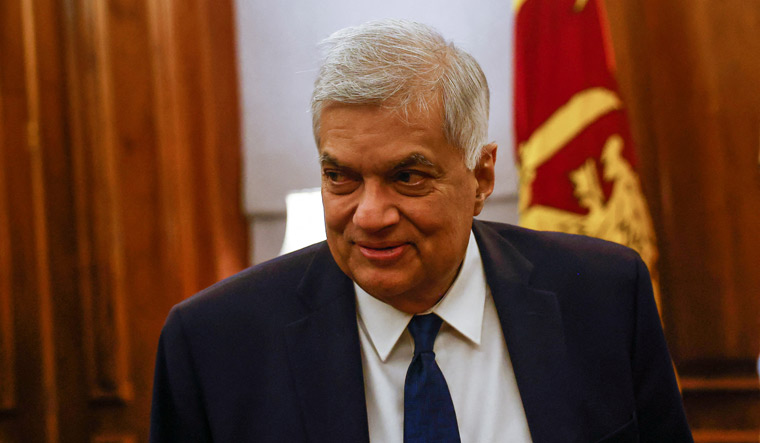President Ranil Wickremesinghe said on Wednesday that he will go ahead with the devolution of powers within a united Sri Lanka and continue with his unpopular decisions to ensure that the bankrupt country recovered from the economic crisis.
In a major policy address, Wickremesinghe also told Parliament that talks with the IMF to unlock a $2.9 billion bailout package are in the final stages.
"We expect to devolve power within a Unitary State. However, I wish to reiterate a fact that has been emphasised on many occasions. There will be no division of the country, Wickremesinghe told lawmakers.
His remarks came days after the powerful Buddhist clergy expressed strong opposition to the move, claiming it challenges the unitary nature of the country.
President Wickremesinghe has underlined the need to fully implement the 13th Amendment to the Constitution to grant political autonomy to the minority Tamils in the country.
India has been pressing Sri Lanka to implement the 13A which was brought in after the Indo-Sri Lankan agreement of 1987.
Sinhalese, mostly Buddhist, make up nearly 75 per cent of Sri Lanka's 22 million population while Tamils are 15 per cent.
Talking about the economic crisis, Wickremesinghe said that Sri Lanka expects to recover from bankruptcy by 2026.
"Let's not be prisoners of the past, but think about the future. Let's unite consensually and move forward democratically to support the recovery of the nation from the current crisis, he said.
He said unpopular decisions taken by him will have positive results in the years to come.
"Remember, I'm not here to be popular. I want to rebuild this nation from the crisis situation it has fallen. Yes, I'm ready to make unpopular decisions for the sake of the nation. People will realise the importance of those decisions in two to three years," he said.
The Sri Lankan government has introduced painful economic measures such as tax hikes and utility rate hikes. Trade unions and opposition groups have organised protests against such measures.
Wickremesinghe said that talks with the IMF are in the final stages and talks with China and other creditors to restructure Sri Lanka's debt are also ongoing.
Sri Lanka was hit by an unprecedented financial crisis in 2022, the worst since its independence from Britain in 1948, due to a severe paucity of foreign exchange reserves, sparking political turmoil in the country which led to the ouster of the all-powerful Rajapaksa family.
The IMF in September last year approved Sri Lanka a $ 2.9 billion bailout package over 4 years pending Sri Lanka's ability to restructure its debt with creditors -- both bilateral and sovereign bond holders.
By the end of June 2022, Sri Lanka owed nearly $40 billion to bilateral, multilateral and commercial loans, according to the figures released by the Treasury.
With assurances from creditors, the $2.9 billion facility could get the IMF board approval in March, officials said.
The IMF facility would enable the island nation to obtain bridging finance from markets and other lending institutions such as the ADB and the World Bank.



